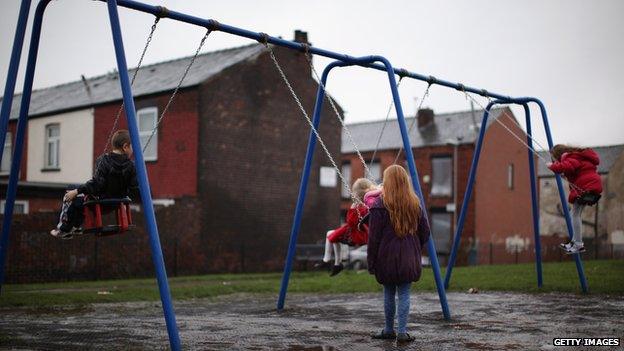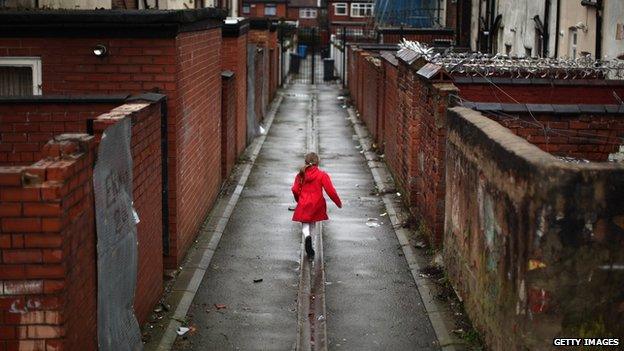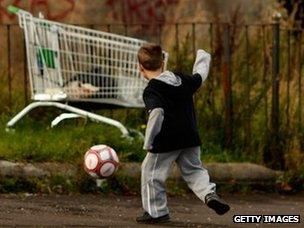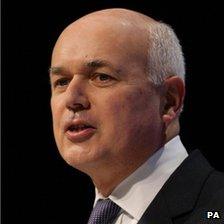Poverty, noun - what's the definition?
- Published
- comments

The government's determination to redefine the word poverty is likely to re-ignite the once red-hot political debate as to whether poverty actually exists in Britain.
There will be many people reading this now who instinctively believe that you cannot have a breadline if everyone can afford bread. It is obvious that the UK does not suffer from the levels of squalor and starvation associated with poverty in previous centuries or less developed countries.
But the deep trepidation felt by those who campaign on behalf of the most deprived and vulnerable citizens is that in challenging the notion of "relative" rather than "absolute poverty', we fatally undermine our commitment to the poorest in our society.
Political acceptance of the concept of "relative poverty" was hard won. An influential voice in the campaign to redefine the word for the 20th Century was Professor Peter Townsend, a left-wing academic who founded the Child Poverty Action Group in 1965.
Ministers want the measure to include parents' employment and not just income
He argued that "individuals, families and groups in the population can be said to be in poverty when… their resources are so seriously below those commanded by the average family that they are in effect excluded from the ordinary living patterns, customs, and activities."
This idea was seen by conservatives, however, as a socialist ideological attack on their values.
On 11 May 1989, John Moore, the Secretary of State for Social Security stood up to make a speech:
"We reject their claims about poverty in the UK", he said of his government's critics, arguing that absolute poverty had been abolished and that relative poverty was no more than inequality. His sentiments echoed the words of a senior civil servant who had told a Parliamentary committee the previous year: "The word poor is one the government actually disputes."
The idea of relative poverty as a measure of social exclusion, however, had taken hold - not just in Britain but also at the Council of Europe, the United Nations and the OECD. It became the yardstick to measure the success of developed countries in dealing with deprivation.

The politics of poverty in the UK has moved markedly with both Labour and Conservative now considering it a real and debilitating consequence of social inequality. Tony Blair walked into No 10 in 1997 promising to "eliminate child poverty" by 2020. David Cameron walked into No 10 in 2010 promising his party was "best placed to fight poverty in our country".
Gone are the days when senior British politicians argue whether relative poverty exists.
There are, though, clearly weaknesses in a measure of poverty based on a proportion of middle income levels. Many find it perverse that if a country gets poorer, the number of people categorised as poor can go down.

The figures published today show that the previous Labour government missed its target of halving the number of children living in poverty by 2010.
In 1998 there were 3.4 million children living in households with an income of less than 60% of the median in the UK. The 2010 figures show this has fallen to 2.3 million - 600,000 short of where ministers had promised to be.
There are those who argue that we should consider it a failure but celebrate the progress made towards an obligation under the Child Poverty Act for the total eradication of child poverty in the UK.
Others, though, question how many of the 1.1 million children apparently lifted out of poverty are the result of a welfare-based conjuring trick.
In a speech this morning, the Work and Pensions Secretary Iain Duncan Smith makes the point that the focus on a poverty line based on relative incomes can skew welfare policy.

Iain Duncan Smith
"By this narrow measure, if you have a family who sit one pound below the poverty line you can do a magical thing," he said. "Give them one pound more, say through increased benefit payments, and you can apparently change everything - you are said to have pulled them out of poverty."
Indeed, today's poverty figures would appear to make his point. Comparing 2010/11 with the previous year, median household income has fallen. The 60% line has dropped from £259 pw to £251 pw.
Families whose income is between those two lines have technically moved out of poverty - even though they may still be struggling on exactly the same income.
It is this perverse outcome that drives the government's determination to redefine poverty - including a basket of other measures such as worklessness and drug dependency that, it is argued, give a more nuanced understanding of deprivation.
Iain Duncan Smith: "Life change" important in measuring poverty
The Child Poverty Action Group, however, is not convinced. Accepting that there is more to poverty than money, they fear the headline income measure will be downgraded and the commitment to reducing relative deprivation and social exclusion enshrined in the Child Poverty Act will be lost.
"To let the ambition of eliminating child poverty in a generation be diluted would be a monumental failure, and breach the legal commitment all parties made under the terms of the Child Poverty Act 2010," they stated in a report earlier month, external.
The terror is that a debate on the meaning of poverty will see, in their words, "the gains of the last decade squandered". Questions about the very existence of poverty, once the centrepiece of political debate in this country, may be asked once more.